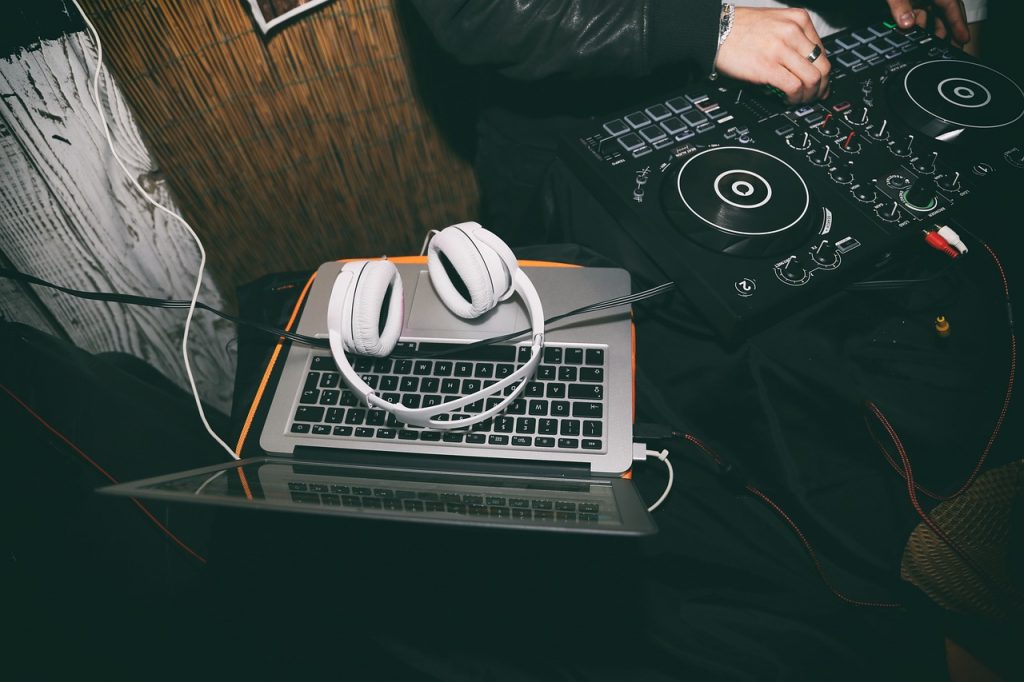
There are many ways that you can monetize your DJ talents and unlock multiple income streams to fuel your passion. Here are 17 creative ways to turn your DJ skills into a profitable career.

Creative Ways to Get Paid for Your DJ Skills
DJ at a bar or restaurant
Many bars feature live DJs to attract new patrons and create a lively atmosphere. For this type of work, it’s great to hone your skills as an open format DJ and have a library of charting and classic hits. Sometimes, bars or restaurants have more genre-specific vibes, such as “deep house brunch” or “downtempo coffeehouse” vibes.
Wedding DJ
Wedding DJs not only mix songs for the dance floor, but they often also serve as the master of ceremonies. As a wedding DJ, in addition to mixing live for the dance party, you might be building playlists for the ceremony, dinner, and cocktail hour. For more information about how to DJ a wedding, see this article.
Create pre-recorded mixes
Sometimes clients will ask for pre-recorded mixes rather than a live set. You can record the mix at home or in your studio and send your client one large audio file to use. You can learn more about how to record your DJ set here. Perhaps someone is throwing a party, and they want music to play in the background, or a hip hop artist wants to create a mixtape to share with fans. You can find and market this type of work on Upwork and Fiverr.
Birthday parties
If someone is having a birthday party, they might hire a caterer, a bartender, and, of course, a DJ. Rather than worrying about song selection throughout the night, the host can rely on you to keep the good vibes going. Birthday parties are often thrown at homes or in hotels, so it’s great to have a mobile setup with a portable sound system. For more information about which gear to have for your mobile DJ gig, see this article.
Teach DJ lessons
People from all walks of life can benefit from learning how to DJ. This includes people seeking full-time jobs as DJs, music producers who want to perform their material live, retirees, hobbyists, and youngsters. You can offer one-on-one lessons, teach at a DJ school, or even create a course. Coursera and Teachable are great resources that allow you to build and market your own course in any area of expertise.
Livestream your DJ set
If you livestream your DJ set on a platform such as Twitch or TikTok, you can make money through gifts, subscriptions, and brand partnerships, among other sources. For more information about how to make money livestreaming, see this article.
Create your own music
If you create your own beats, you can make money from streaming royalties and placement in film and TV. For more information about how to produce your own music, see this article.
Create remixes for artists
You can make money by taking the acapella and/or stems of an artist’s song and adding your own production. Sometimes labels or artists will pay you for this service, and it can become especially lucrative if you have a large following and offer to play an artist’s song in your DJ sets.
DJ for radio stations
Radio stations sometimes pay DJs a salary to have their own mix shows. A great personality and speaking voice help for this kind of work.
Have an online radio show
In addition to being a live radio DJ, you can create your own radio show and post to a site such as Mixcloud. You can then work towards making money from advertisements and subscriptions.
DJ at school dances
School dances and proms need DJs to keep the kids happy and help build a sense of community. For this kind of work, it’s great to have a library of clean and contemporary music. BPM Supreme offers clean versions of mainstream songs, plus other versions you may need for gigs like extended and intros.
Touring DJ
If you produce your own songs, work with labels, and have built a large online following, you can make a lot of money per show when you perform your material. If you have a name, people will buy tickets to see you, which means venues will offer you large upfront fees. You can also work with venues that allow you to sell tickets directly to your fans and keep the revenue. The business model for touring DJs is much like that of rock bands.
Nightclub DJ
Nightclubs often hire a DJ to entertain guests. Many nightclubs have genre-specific nights, such as hip hop or deep house. Often, a nightclub will call for a DJ to play an open format mix of high-energy and contemporary hits.
Curate independent artist playlists on Spotify
Your sensitivity to music and ability to pick out hits and songs people resonate with can pay off in many ways. One of those is playlist curation. Spotify playlists are a great way for independent artists to gain new listeners. If you manage a playlist with a large following, you can charge artists to submit songs for your review.
Keep in mind that it is against Spotify’s terms of service for you to charge an artist for song placement. However, it is not against Spotify’s terms for you to charge to review a song for possible placement. It is then up to you, once you listen to the song, to decide to place it on the list. Companies that pay playlist curators to work with artists include Mysphera and Playlist Push.
Curate playlists for gyms, restaurants, and other establishments
Even if you are not DJing live, establishments often seek someone who understands music well to build libraries of songs that play in the background.
DJ at sports games
Sports games call for DJs to keep the crowd energized before, during, and after the game. Often sports DJs will make announcements as well.
DJ on TV
You might be surprised by how many TV shows and commercials call for people who know how to DJ. You can find postings for this kind of work on Casting Networks or Backstage. You never know. If you send in a performance video, you could be the DJ for the next Tesla commercial.
These are just a few of the ways you can make money with your DJ skills and music sensibility. It’s important to stay flexible and adapt to changes in the economy, technology, and the entertainment industry. With these changes comes new income streams, so it’s good to be ready to seize these opportunities.

